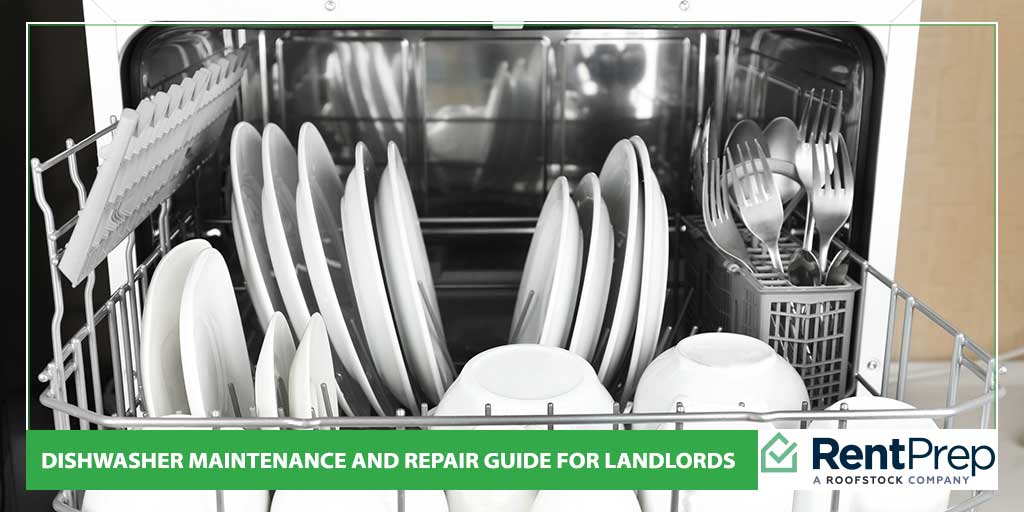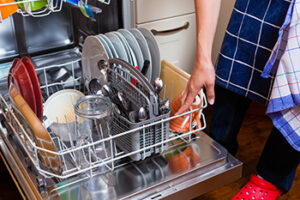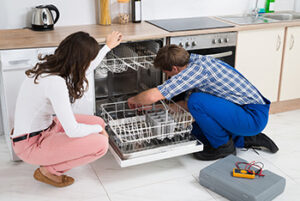
Dishwashers are such handy appliances that it’s hard for most people to imagine going without one for long. If your rental property includes a dishwasher, it’s a good idea to get familiar with some of the basic maintenance tasks associated with dishwashers so you can keep it working for many years.
Poor maintenance can lead to less than impressive performance and eventually some costly repairs. Learning about dishwasher upkeep, troubleshooting and the signs for when it’s time to call a repair service are just part of a landlord’s responsibilities to the tenant and to the property.
Dishwasher Maintenance
If your tenant calls you with a maintenance request involving the dishwasher, don’t call the repair service quite yet.
The most common problem is that the dishwasher is not cleaning the dishes properly and that is easier to remedy than you might think. When your tenant starts complaining about the dishwasher’s performance, grab the appliance guide that came with it and head over to the rental to see if you can work it out on your own.
Here are 7 tips on troubleshooting a dishwasher that isn’t cleaning properly:
Tip 1: Review Proper Use
Problem: Dishwashers are wonderful and useful, but can’t work properly if they are not being used right or being run with the wrong kind of detergent. Dishwashers come with an array of settings, from short washes to high heat drying and everything in between. Your tenant may not know what setting is best to use, so consult the manual together for a tutorial. Also, many tenants are under the impression that putting food-caked dishes in a dishwasher won’t affect the quality of a dishwashing cycle, but of course that practice can be the source of poor results. Improper loading can also hinder the dishwasher’s effectiveness.
Solution: Talk with your tenant about proper loading for maximum results, and remind them that overcrowding dishes will hamper the water spray patterns in the dishwasher. Poor spraying will definitely prevent proper cleaning and require them to rewash the entire load. Ask them to make sure dishes are rinsed off before putting them in the dishwasher because food particles get spread around to other dishes and then harden on during drying. Proper loading, like facing dirty dishes toward the sprayer arms instead of away, make a big difference. Proper use of the dishwasher is often all it takes to ensure clean dishes and happy tenants.
Tip 2: Proper Detergent

Problem: Even if the dishwasher is working properly, using the wrong kind or amount of detergent can alter the outcome of the washing cycle. Too much liquid detergent can clog up the dishwasher and leave a film or residue on dishes. Also, not enough detergent will hinder the dishwasher from getting dishes clean.
Solution: In consumer tests, gels and liquid detergents don’t usually perform as well, while powder and tabs will give better results. Often, the manufacturer will give a recommendation for the type of detergent to use right in the appliance guide. Using a rinse aid is another way to ensure cleaner dishes every time.
Tip 3. Clean the Dishwasher Interior
Problem: Even homeowners often neglect to clean the inside of the dishwasher. After all, it gets a constant bath all the time, right? Actually, it’s quite easy for debris and particles to get stuck inside the dishwasher and coat and re-coat dishes as they break down over time. Unnoticed big items like pieces of glass or plastic can plug the filters and prevent proper drainage.
Solution: Remove the racks from the dishwasher and get a good look inside. Remove any large pieces of debris you can find. Clean the inside of the dishwasher with a vinegar-water mixture and scrub up any hard water scales with a vinegar and baking soda paste. Rinse clean before the next use. Many experts recommend running an empty load with a citrus cleaner or a few scoops of the drink mix Tang. The citric properties help get rid of hard water buildup and clean out the system.
Tip 4: Clean the Seals and Soap Cup
Problem: Every dishwasher is fitted with rubber seals to keep water inside the unit. Over time, the seals can become thick with gunk and fail to seal properly. Also, soap residue can build up inside the soap cup and contribute to problems with dishwasher performance.
Solution: Use a small soft-bristle brush to scrub the rubber seals around the dishwasher door. Be sure to get in between the folds of the seal where dirt and grime is most likely to hide. Really focus on the space between the bottom of the door and the dishwasher tub, where some of the worst buildup can occur. Use the same brush to clean the soap dispenser cup and door, plus any other small features on the inside of the door. Rinse with clean water and wipe up any leftover residue.
Tip 5: Clean and/or Replace Filters
Problem: Dishwashers have two filters, one large and one small (or coarse and fine). Filters are designed to catch food bits and other debris, and they get dirty or blocked very quickly. Sometimes the dishwasher filters develop holes or warp so that they aren’t doing the best job of trapping debris. If the filter is not working properly, like a piece has broken off, a screen has a hole, the plastic is warped or it just doesn’t fit right anymore, it could definitely affect the performance of the dishwashing cycle.
Solution: Use the information on the appliance manual to correctly take out the filter or filters and empty them of any debris (some models don’t have a removable large filter). Unless you or the tenant have been doing this every month or so, you will probably be surprised at the amount of gunk there. Clean them with hot water and a soft scrub brush, then replace. If the filter is warped or has a hole or tear in it, find the part number for the filter that is damaged in the manual. Then, call the company or your local appliance repair store to order a new one. The cost for a replacement filter will be significantly less than it would be for a repair person to do it and then come and install it.
Tip 6: Remove and Unclog Spray Arms
Problem: The sprayers on the top and bottom of the dishwasher can easily become plugged up, keeping clean water from reaching the dishes during a cycle. Especially with hard water, a clogged spray arm can turn a good dishwasher into a problem.
Solution: Use the appliance guide to take the sprayer arms out of the dishwasher for a closer inspection. Use a flexible wire, a pipe cleaner or eyeglass screwdriver to clear away any gunk in the holes on the sprayer arms. Don’t use a toothpick or similar tool because they can break off and get lodged inside the sprayer arm. Push inside to where you can’t see a few times to ensure the water has a clear path to exit the arm. Then, soak the sprayer arm in white vinegar or other hard water remover solution to further eliminate buildup. Rinse with clear water and replace back in the dishwasher.
Tip 7: Repair Dish Racks
Problem: The dishwasher racks are metal coated with plastic. After a while, the plastic can wear down and expose the metal. When the metal is exposed to cycle after cycle of warm water, it can begin to corrode, leaving a fine residue over all the dishes. As you inspect the dishwasher, check the racks for any exposed metal, which could be the culprit for a poorly performing dishwasher.
Solution: Most hardware and home improvement stores carry tine tips, which are small rubber or plastic end caps that completely cover exposed metal on the tips of the racks. There is also commercial paint/sealant available that can cover up exposed metal and prevent further problems. If the dishwasher rack is well beyond a few touchups, get the appliance guide and order a new rack from the manufacturer. Remember, you can also order all kinds of dishwasher parts like soap dish doors, rack wheel and more and save yourself money by avoiding a service call.
When to Call A Dishwasher Repair Service

Sometimes, there are clear signs that the problem with the dishwasher is beyond your capabilities and requires the services of a dishwasher/appliance repair company. If the problem that your tenant describes is something beyond unclean dishes, you may need to schedule an appointment to get the dishwasher serviced.
Here are the top 7 things that most likely indicate that it is time to contact a dishwasher repair specialist:
1. Low water temperature
Dishwashers should always have hot water to clean dishes, so if you or the tenant notices that the water is lukewarm or cool immediately after a cycle, that signals a problem with the unit. Another way to check the temperature is that the dishes should feel warm to hot right after a cycle has finished up.
2. No water
If you or the tenant aren’t hearing water whoosh through the dishwasher during a cycle, or you only hear faint trickles, that’s a big problem and should get attention as soon as possible.
3. Water isn’t draining
If you or the tenant see water pooling at the bottom of the dishwasher, there is certainly trouble with the inner workings. While it is possible to have pooled water if the cycle has been inadvertently interrupted, if the cycle is complete and there is still water on the bottom, you’ll need professional help.
4. Irregular noises or burning smell
Dishwashers aren’t the quietest of appliances, but if you or the tenant hear anything outside the gentle motor sounds and rushing water, it’s time to make that call to the repair service. Grinding, clicking and other mechanical sounds are a big red flag for dishwashers. A burning smell may just be something plastic falling against the heating coils inside the dishwasher, but if there’s nothing there and you and the tenant still smell burning when the unit is running, stop it immediately and call.
5. Broken door lock
A dishwasher is no good if the door cannot be secured shut. Broken latches or jammed elements of the latch can render an otherwise perfectly functioning dishwasher completely unusable.
6. Cracks in the interior lining
While it doesn’t happen often, dishwashers can develop cracks in the interior lining, which can cause all kinds of trouble with keeping the water sealed inside. Cracks can also indicate other problems that only a professional can remedy.
7. Rust or mold
A working dishwasher should drain and vent properly, leaving no room for rust or mold. If you or your tenant notices either rust or mold inside the dishwasher, there’s a problem with the unit and time to schedule an appointment.
If you must call a repair service, look for a company with a good reputation and can handle your particular brand and model. Because a dishwasher isn’t a mandatory appliance to have when it comes to habitability for the tenant, you can schedule the repair for a time that is convenient for you and the tenant. Unless there is water leaking everywhere, most repair services will have available appointments anywhere from one to five days out.
A dishwasher is a valuable amenity for tenants and by working together on maintenance and care, you and your tenant can ensure many years of good, solid washing cycles and very little downtime.

